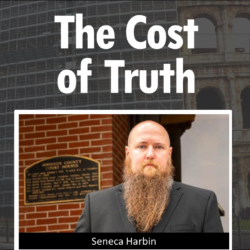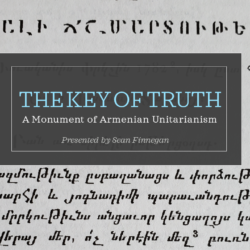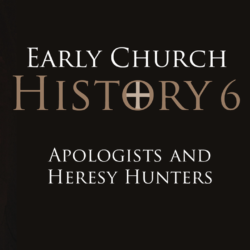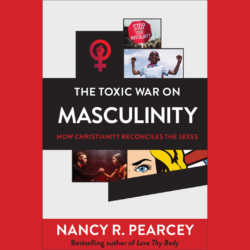Apologetics 2: What Is Truth?
In order to establish any of the claims of Christianity, we must first make a case for truth itself. How can you hope to provide reasons for God’s existence or Christ’s resurrection if the person your talking to claims, “That’s just your truth, and I’m glad it works for you, but it’s not true for me?” Learn how to use the law of non-contradiction to help explain what an objective truth claim is. Although many prefer the mushy relativism of our age, in the end, as Christians, we are stuck with Chris who claimed to be “the way, the truth, and the life,” and that “no one comes to the father but through me” (John 14.6).
If you would like to take this class for credit, please contact the Atlanta Bible College so you can register and do the necessary work for a grade.
Notes:
pluralism/multi-culturalism definition:
- a theory that there are more than one or more than two kinds of ultimate reality
- a state of society in which members of diverse ethnic, racial, religious, or social groups maintain and develop their traditional culture or special interest within the confines of a common civilization
when Christians and non-believers are the only two options, life is simple
- throwing in Muslims, Hindus, Buddhists,
- Diana Eck’s four points on pluralism[1]
- First, pluralism is not diversity alone, but the energetic engagement with diversity. Diversity can and has meant the creation of religious ghettoes with little traffic between or among them. Today, religious diversity is a given, but pluralism is not a given; it is an achievement. Mere diversity without real encounter and relationship will yield increasing tensions in our societies.
- Second, pluralism is not just tolerance, but the active seeking of understanding across lines of difference. Tolerance is a necessary public virtue, but it does not require Christians and Muslims, Hindus, Jews, and ardent secularists to know anything about one another. Tolerance is too thin a foundation for a world of religious difference and proximity. It does nothing to remove our ignorance of one another, and leaves in place the stereotype, the half-truth, the fears that underlie old patterns of division and violence. In the world in which we live today, our ignorance of one another will be increasingly costly.
- Third, pluralism is not relativism, but the encounter of commitments. The new paradigm of pluralism does not require us to leave our identities and our commitments behind, for pluralism is the encounter of commitments. It means holding our deepest differences, even our religious differences, not in isolation, but in relationship to one another.
- Fourth, pluralism is based on dialogue. The language of pluralism is that of dialogue and encounter, give and take, criticism and self-criticism. Dialogue means both speaking and listening, and that process reveals both common understandings and real differences. Dialogue does not mean everyone at the “table” will agree with one another. Pluralism involves the commitment to being at the table — with one’s commitments.
- challenges of pluralism
- compete for adherents, financial contributions, legitimacy, political influence
- intermarriage (raising children), national identity, public education (Halloween for Christians), workplace (prayer time for Muslims, Sabbath for Jews)
- specific challenge to Christianity
- is Jesus really the only way?
- are all non-Christians going to hell? (more than 2/3 of the world)
- isn’t it intolerant and bigoted to say we have the only right way to God?
- cultures have their own moral standards, how can we say they are wrong
- blind men and the elephant…all religions are equal paths to God
- for example consider the crucifixion of Jesus
- Islam teaches it never happened
- Judaism teaches it happened but it is at best martyrdom and at worst just punishment
- Christianity teaches it happened and because of it our sins are forgiven
- These cannot all be right!
modernism
- rise of modern science
- progress
- reason will eventually give every answer
- reason was king and faith was second
- 20th century
- like humans working together on the unified project of constructing the tower of babel, trying to reach the heavens and build a monument to his own achievement
post-modernism
- taylor mali video
- like people after the tower of babel fell, when they no longer have shared assumptions and a shared context, but each has his own view expressed in his own way…combined with a unique distrust of the mentality that went into constructing the utopian world (symbolized by the tower) that has crashed down around them
- suspicion of all truth claims, since often truth claims are really just attempts to control people
- reality is not out there but is constructed as your mind experiences it
- interpretation is everything
- incredulity toward all meta-narratives (big stories), rejection of any one story
- concrete experience is better than abstract principles
- socially constructed truth
objective truth: something is true regardless of who believes it
- ex: there is only one moon orbiting the earth
subjective truth: something that is true for some people but not others
- peanut butter cup is the best ice-cream
- I can say, “I’m married to Ruth Finnegan” but you can’t
- true for me not for you
relativism: denial of objective truth
- self-defeating
- the statement “there is no objective truth” requires there to be at least one objective truth, namely that “there is no objective truth” but this is a contradiction
the law of non-contradiction
A ≠ ~A
Buddhist and Christian in a coffee shop
- Buddhist (B): “Why can’t we all be right?”
- Christian (C): “if Jesus offers the only way of salvation then there cannot also be other ways of salvation”
- B: “that may be true for you, but not for me”
- C: “but this violates the law of non-contradiction”
- B: “so, then I guess I don’t believe in that law”
- C: “let’s call your principle the law of relativism”
A=~A Law of Relativism
A≠~A Law of Non-Contradiction
- C: “do you believe the Law of Relativism is true and the Law of Non-Contradiction is false?”
- B: “Yes, the law of non-contradiction is clearly false”
- C: “let’s call the law of relativism A and the law of non-contradiction ~A”
A=~A Law of Relativism => A
A≠~A Law of Non-Contradiction =>~A
- C: “so you agree that A ≠ ~A?”
- B: “yes”
- C: “but that is the law of non-contradiction! you simply used the law of non-contradiction to disprove it, but if it is false, then you can’t use it at all!”
this law works for objective truths but not subjective ones
PB cup icecream is the best is equally true as cookie dough icecream is the best
so is religion like icecream preference or like the moon orbiting the sun?
are some religions subjective?
- is New Age: “the law of attraction”, “there is an energy that pervades everything”, etc.
- is the religion of pluralism? “all religions contain partial truth”, “we should not say any one religion is right”
For example consider the bedrock of Christianity—the resurrection of Jesus
- “God raised Jesus from the dead about two thousand years ago”
- this is an objective truth, right? either it happened or not!
- this is because historical events are objective truths
- listen to Paul (1 Corinthians 15.14, 17, 20)
As Christians we are stuck with exclusivism:
exclusivism is the idea that there is only one right way
- John 3.13-21 believe in the Son to attain eternal life
- John 5.16-30 Jesus is the one who will judge (unique combination of humility and authority)
- John 6.39-40, 44, 53-54 Jesus will resurrect on the last day
- John 8.23-30 The Pharisees must believe in Jesus or else die in their sins
- John 12.44-50 Jesus came to save and his word will judge on the last day
The “I Am” Statements
- I am the bread of life (John 6.48-51)
- “I am the living bread that came down out of heaven; if anyone eats of this bread, he will live forever; and the bread also which I will give for the life of the world is My flesh.”
- I am the light of the world (John 8.12)
- “Then Jesus again spoke to them, saying, “I am the Light of the world; he who follows Me will not walk in the darkness, but will have the Light of life.”
- I am the door (John 10.9)
- “I am the door; if anyone enters through Me, he will be saved, and will go in and out and find pasture.”
- I am the good shepherd (John 10.11)
- “I am the good shepherd; the good shepherd lays down His life for the sheep.”
- I am the resurrection and the life (John 11.25)
- “Jesus said to her, ‘I am the resurrection and the life; he who believes in Me will live even if he dies’”
- I am the way, and the truth, and the life (John 14.6) (The most exclusivistic verse in the Bible)
- “Jesus said to him, ‘I am the way, and the truth, and the life; no one comes to the Father but through Me.’”
- I am the vine (John 15.5)
- “I am the vine, you are the branches; he who abides in Me and I in him, he bears much fruit, for apart from Me you can do nothing.”
——————————-
[1] from the pluralism project at Harvard University (pluralism.org/pages/pluralism/what_is_pluralism)







Thanks Sean for making these available. This is great information and I know it will benefit all who get to listen to it.